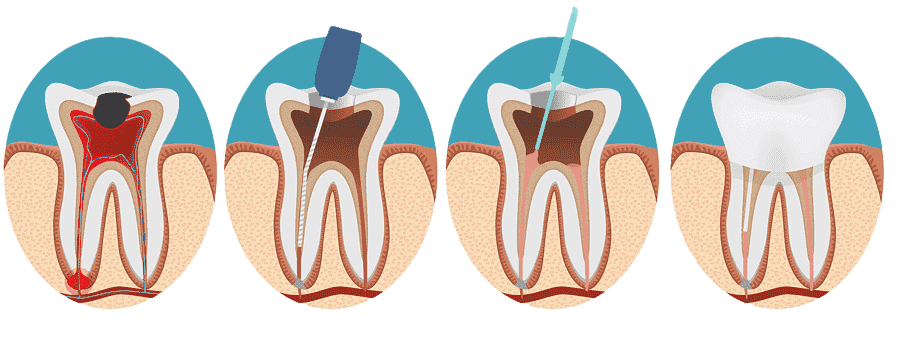WSD Essentials (Scaling & Polishing, Fluoride Treatment, Full Mouth X-rays) at $98 nett. Learn more.
WSD Essentials (Scaling & Polishing, Fluoride Treatment, Full Mouth X-rays) at $98 nett. Learn more.
WSD Essentials (Scaling & Polishing, Fluoride Treatment, Full Mouth X-rays) at $98 nett. Learn more.
WSD Essentials (Scaling & Polishing, Fluoride Treatment, Full Mouth X-rays) at $98 nett. Learn more.
When your tooth is severely damaged due from its decay, it leads to pulp inflammation, causing pain in your face, jaw, or teeth, due to the infected tooth.
This is when root canal treatments are required, to remove the infected pulp in your tooth — eliminating the root cause of your pain and discomfort.

Root canal treatment involves removing infected or inflamed pulp from inside your tooth. After numbing the area with local anaesthetic, the dentist carefully cleans and disinfects the canal, then fills and seals the space to prevent future infection.
A dental crown is often placed over the treated tooth to protect and restore its function. This conservative approach allows you to save your natural tooth — avoiding extraction and implants.
Not sure if you need root canal treatment? You might, if you experience:
A continuous toothache that doesn’t go away may signal deep infection or nerve damage inside the tooth. The pain can be spontaneous, throbbing, or disturb your sleep at night.
If biting or chewing causes sharp or lingering pain, it could mean the tooth’s pulp is inflamed or infected. This discomfort often gets worse over time without treatment.
A tooth that stays sensitive long after exposure to hot drinks, ice, or cold air may indicate damage to the tooth’s nerves — often an early sign that root canal therapy is needed.
Swelling, redness, or tenderness around the affected tooth may be your body’s way of fighting infection. Sometimes, a small pimple-like bump can also appear on the gum.
Trauma or untreated decay can damage the inner pulp of a tooth, causing visible darkening, cracks, or chips. These weak points make the tooth more prone to infection.
The presence of pus, foul taste, or drainage is a sign of an abscess. This means infection has spread and immediate dental care is required to prevent further complications.

If you’re asking yourself, “Why do I need root canal treatment?”, these symptoms are your body’s way of signalling a possible infection. Seeking timely care can save the tooth and prevent more extensive treatment later.
Not sure if you need root canal treatment? You might, if you experience:
If you’re asking yourself, “Why do I need root canal treatment?”, these symptoms are your body’s way of signalling a possible infection. Seeking timely care can save the tooth and prevent more extensive treatment later.
Root canal infections develop when bacteria reach the tooth’s inner pulp. Common causes include:

When decay reaches the inner pulp, bacteria cause infection that can no longer be reversed with a filling.

Even hairline cracks allow bacteria to penetrate and infect the pulp.

Multiple treatments can stress or expose the pulp, increasing the risk of infection.

Impact from accidents or falls can damage the pulp, even without visible signs.

Failing fillings or crowns can allow bacteria to seep into the inner tooth.

Severe periodontal infection can reach the pulp through the root canals.
We offer both standard and advanced root canal treatments in Singapore:
The most common method. The canals are cleaned, disinfected, and sealed in one or more appointments.
Recommended for complex or previously failed cases, this involves surgically removing the tip of the tooth root to eliminate infection.
Root canal therapy may sound intimidating, but it’s a safe, common, and highly effective treatment that can save your natural tooth. At WeSmile Dental, our experienced dentists follow a step-by-step process to ensure the infection is thoroughly removed and your tooth is fully restored.

The process starts when decay reaches the pulp, causing pain, swelling, or an abscess at the tooth root.
A small access hole is made in the crown of the tooth to reach the infected pulp.
Special instruments called endodontic files are used to remove the infected tissue and clean the canals thoroughly.
The cleaned root canals are filled with a biocompatible material (usually gutta-percha) and sealed to prevent reinfection.
In some cases, a supportive post is inserted for additional strength before sealing the opening with filling material.
A custom-made crown is placed over the tooth to restore its full function and protect it from future damage.
Each step is essential to ensure the infection is fully eliminated and the tooth remains strong and functional for years to come.
The cost of a root canal treatment depends on the location of the tooth (anterior or mola, or pre-molar), and the severity of your condition. On average, the root canal treatment can cost from $350 and above for front teeth, from $500 for premolars (fourth and fifth tooth), and from $800 for molars. The reason for the increasing cost is due to both the size, and the number of roots that the tooth has. Molars are the most expensive as they are the largest, and can have up to 3 roots which increases the complexity and requires more skill to clean.
This excludes consultation, X-ray, investigation, re-treatment fees, and other related costs which includes the provision of a crown if needed after the root canal treatment.

Root canal treatment is not MediSave-claimable, but it is covered under CHAS subsidies for eligible Singapore citizens. These subsidies also apply to permanent dental crowns placed after treatment.
| Dental Service | CHAS Subsidies |
| Root Canal – Anterior | $109.50 |
| Root Canal – Pre-molar | $140.00 |
| Root Canal – Molar | $170.50 |
| Permanent Crown | $84.50 |
| Dental Service | CHAS Subsidies |
| Root Canal – Anterior | $164.00 |
| Root Canal – Pre-molar | $210.00 |
| Root Canal – Molar | $256.50 |
| Permanent Crown | $127.50 |
| Dental Service | CHAS Subsidies |
| Root Canal – Anterior | $169.00 |
| Root Canal – Pre-molar | $215.00 |
| Root Canal – Molar | $261.50 |
| Permanent Crown | $132.50 |
| Dental Service | CHAS Subsidies |
| Root Canal – Anterior | $174.00 |
| Root Canal – Pre-molar | $220.00 |
| Root Canal – Molar | $266.50 |
| Permanent Crown | $137.50 |
Each CHAS-eligible patient may claim up to:
You can refer to the official CHAS website for the most up-to-date information.
CHAS subsidies for dental treatments like root canal therapy will increase substantially from Q4 2025, as part of MOH’s enhanced oral care support:
Flexi-MediSave will also be expanded to cover selected dental procedures—including crowns and root canals—at CHAS GP clinics from mid-2026.
These enhancements are designed to reduce out-of-pocket costs and improve accessibility to essential dental care for all Singaporeans.
Recovery is usually quick—most people feel better within a few days. Some sensitivity when biting or brushing is normal early on, but you shouldn’t experience ongoing or worsening pain. If you do, it’s best to follow up with your dentist.
A little extra care goes a long way in helping your tooth heal well. Here’s what you can do:
✅ Skip the smoking – it delays healing and increases the risk of infection.
✅ Keep your mouth clean – brush gently after meals and floss daily to reduce bacteria.
✅ Protect the treated tooth – avoid chewing on it until your dentist places a permanent crown or filling.
✅ Stick to soft foods for a few days – options like soups, scrambled eggs, or smoothies are easy on your bite.
From
Contrary to popular belief, modern root canal procedures are relatively painless. Using local anaesthetic, the entire procedure feels much like a filling.
In fact, the pain from an untreated tooth infection is far worse than the temporary discomfort following treatment. Most patients resume normal activities within a day or two.
With proper care, a root canal-treated tooth can last just as long as your natural teeth.
Durability depends on factors such as:
Root canal therapy is considered very safe. Most side effects are mild and short-lived:
Rare complications, such as reinfection, can be addressed with re-treatment or surgical intervention.